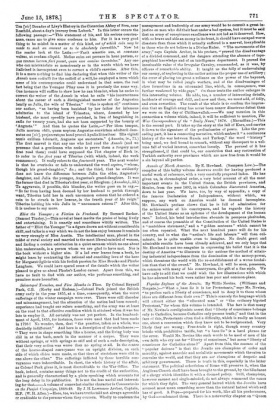CURRENT LITERATURE.
Tacitus and Bracciolini : the Annals Forged in the Fifteenth Century. (Diprose and Bateman.)—This is one of the most curious books that ever came before us. It is full of elaborate critical arguments,—arga- meats drawn from style, from peculiar usages, from such subtleties as alliteration and position of words, from coins, from inscriptions, from all, in short, that it belongs to the most accomplished scholar to know. And all the while it betrays an ignorance that is perfectly astounding. We will give an instance which of itself is quite sufficient to " nonsuit" the writer altogether. He tells us that at one time, Bracciolini, being hard at work on his Tacitus forgery, found the work so laborious that he was inclined to tarn aside to the easier task of forging Livy ; and that with this view he wrote to his friend Ni000li, telling him how a " learned Goth, who had been a great traveller, had told him that he had seen the Ten [sic] Decades of Livy's History in the Cistercian Abbey of Sore, near Roschild, about a day's journey from Lubeck." In this letter occurs the following passage :—" This statement of his, and his serious counten- ance, cause me to give some credence to him. For it is a very good thing to be misled in a matter of this kind, out of which coin may be made to such an amount as to be absolutely incredible." Now let the reader look at the Latin :—" Facit assertio sue, et constans raltus, ut credam aliquid. Melina enim est peccare in hanc partem, ex qua tantum lucrum fieri posset, quam esse omnino incredulus." Any one who can mistranslate so monstrously as in the words which we have italicised is incompetent even to correct a child's exercise. After this, it is a mere nothing to find him declaring that when this writer of the Annals uses codicilli for the codicil of a will, he employed a term which none of his contemporaries could understand in that sense, the real fact being that the Younger Pliny uses it in precisely the same way. One instance will suffice to show how he can blunder, when be seeks to correct the writer of the Annals in what he calls "his incorrectness about the career of such a distinguished member of the Augustan family as Julia, the wife of Tiberius." "She is spoken of," continues our author, "as having been banished by her father for infamous adulteries to the island of Trimetus, where, deserted by her hnsband, she must speedily have perished, in lieu of languishing in exile for twenty years, had she not been supported by the bounty of Augusta.'" And then he quotes the Latin,—" Per idem tempus, Julia mortem obiit, quam neptem Augustus convictam adulterii dam- flatus eat [sic], projeceratque baud procul Apulia littoribtur Illis viginti annis exilium toleravit, Augustan ape sustentata." (Annales, iv., 71.) The first marvel is that any one who had read the Annals (and we presume that a gentleman who seeks to prove them a forgery must first read them) could have supposed the 71st chapter of Book iv. to refer to the first year of Tiberius (with which, indeed, the work commences). It really refers to the fourteenth year. The next wonder is that he overlooks or fails to understand the word neptem, "whom, though his grand-daughter," &c. ; and the third, that he evidently does not know the difference between Julia the elder, Augustus's daughter, and Julia the younger, Augustus's grand-daughter. It was the former that died in Tiberins's first year, at Rhegium. (Annales,i., 53.) To aggravate, if possible, this blunder, the writer goes on to say,- " So far from having been doomed by her husband to perish through want, Tiberius held her in such uncommon esteem that he ordered a coin to be struck in her honour, in the fourth year of his reign." Tiberius holding his wife Julia in " uncommon esteem !" After this, it is useless to Bay more.



































 Previous page
Previous page